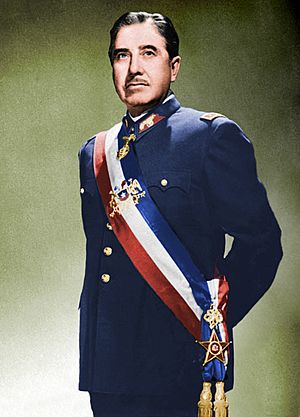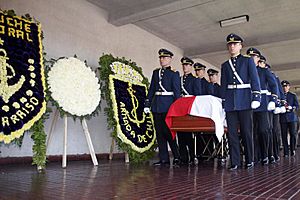Augusto Pinochet facts for kids
Quick facts for kids
Augusto Pinochet
OMCh
|
|
|---|---|

Official portrait, c. 1974
|
|
| 29th President of Chile | |
| In office 17 December 1974 – 11 March 1990 |
|
| Preceded by | Salvador Allende |
| Succeeded by | Patricio Aylwin |
|
President of the Government Junta of Chile
|
|
| In office 11 September 1973 – 11 March 1981 |
|
| Preceded by | Position established |
| Succeeded by | José Toribio Merino |
| Senator-for-life of Chile | |
| In office 11 March 1998 – 4 July 2002 |
|
|
Commander-in-Chief of the Chilean Army
|
|
| In office 23 August 1973 – 11 March 1998 |
|
| President | |
| Preceded by | Carlos Prats |
| Succeeded by | Ricardo Izurieta |
| Personal details | |
| Born |
Augusto José Ramón Pinochet Ugarte
25 November 1915 Valparaíso, Chile |
| Died | 10 December 2006 (aged 91) Santiago, Chile |
| Resting place | Los Boldos, Santo Domingo Valparaíso, Chile |
| Political party | Independent |
| Spouse | |
| Children | 5, including Inés Lucía Pinochet |
| Alma mater | Chilean War Academy |
| Occupation |
|
| Profession | Military |
| Signature |  |
| Nicknames | El Tata, Mi General |
| Military service | |
| Allegiance | |
| Branch/service | |
| Years of service | 1931–1998 |
| Rank | |
| Unit |
|
| Commands |
|
| Battles/wars | Cold War
|
Augusto José Ramón Pinochet Ugarte (25 November 1915 – 10 December 2006) was a Chilean general and a leader who governed Chile from 1973 to 1990. His time in power was the longest of any Chilean leader in history.
Contents
Early Life and Education
Augusto José Ramón Pinochet Ugarte was born in Valparaíso, Chile, on November 25, 1915. His father was Augusto Pinochet Vera, whose family came from France in the 1700s. His mother was Avelina Ugarte Martínez, whose family had lived in Chile since the 1600s.
Pinochet attended several schools, including the San Rafael Seminary in Valparaíso and the Rafael Ariztía Institute. He later entered the Military School in Santiago in 1931.
In 1935, after four years of studying military geography, he graduated as a Second Lieutenant in the infantry.
Career and Rule in Chile
Augusto Pinochet steadily rose through the ranks of the Chilean Army. By early 1972, he became the General Chief of Staff. On August 23, 1973, President Salvador Allende appointed him as the Commander-in-Chief of the Chilean Army.
On September 11, 1973, Pinochet took control of Chile in a military takeover. This event ended the civilian government that had been in place.
In December 1974, the military leaders named Pinochet the Supreme Head of the nation. During his time in power, many people who disagreed with his government faced severe consequences. Between 1,200 and 3,200 people were killed, and tens of thousands were held in special camps or tortured. The Chilean government later confirmed that at least 3,095 people were either executed or went missing.
Pinochet's government also made big changes to the economy. They worked to stabilize the currency and removed taxes on imported goods. They also made it harder for workers to form unions and sold many government-owned businesses to private companies. Some of these properties were sold for less than they were worth. These economic ideas were influenced by economist Milton Friedman.
His government also controlled what people could watch or listen to in entertainment. These policies led to strong economic growth for a while. However, some people argue that the gap between rich and poor grew much larger. They also believe these policies contributed to a major economic crisis in 1982.
For much of the 1990s, Chile's economy was one of the strongest in Latin America. Pinochet's wealth also grew significantly during his rule. He had many secret bank accounts in other countries and owned a lot of property.
Pinochet's 17-year rule was supported by a new constitution approved in 1980. In 1988, a vote was held to decide if Pinochet should stay in power for another eight and a half years. About 56% of the people voted against him staying. Pinochet accepted these results and stepped down in 1990. Patricio Aylwin then became the new president.
After leaving the presidency in 1990, Pinochet remained Commander-in-Chief of the Chilean Army until 1998. He then retired and became a senator for life, as allowed by the 1980 Constitution. However, he was later arrested in London in 1998 due to accusations of serious human rights violations.
After a legal process, he was released due to health reasons and returned to Chile in 2000. In 2004, a Chilean judge ruled that Pinochet was healthy enough to face trial. By the time he passed away in 2006, he was facing many charges related to human rights issues during his rule. He was also accused of financial wrongdoing.
Pinochet died on December 10, 2006, without being found guilty of any of the crimes he was accused of.
Personality and Interests
Pinochet was often seen as a simple man who didn't care much for culture. This image was partly because he presented himself that way.
He was also known for being a private person, not sharing his thoughts or feelings easily.
Private Library
During his life, Pinochet collected over 55,000 books for his personal library. These books were valued at about 2.8 million US dollars in 2006-2007. The public learned about his large collection only after a police search in 2006. Pinochet bought books from small shops in Santiago and also had military officials buy books for him from other countries. He used government funds for these purchases while he was in power.
His library included many rare books, such as a first edition of Historica relacion del Reyno de Chile from 1646. It also had an original letter from Bernardo O'Higgins, a Chilean independence leader. A large part of the books from the library of former president José Manuel Balmaceda were also found in Pinochet's collection. Interestingly, Pinochet's library had almost no poetry or fiction books.
Personal Life
Pinochet married Lucía Hiriart Rodríguez on January 30, 1943. They had five children together: three daughters named Inés Lucía, María Verónica, and Jacqueline Marie, and two sons named Augusto Osvaldo and Marco Antonio.
Death and Funeral
Pinochet had a heart attack on December 3, 2006. He passed away on December 10, 2006, at the Military Hospital in Santiago, surrounded by his family. The cause of death was heart failure and fluid in his lungs.
The government decided not to hold a state funeral for him. Instead, he received a military funeral as a former Commander-in-Chief of the Army. The government also did not declare a national day of mourning. However, flags at military bases were lowered to half-staff, and the Chilean flag was placed on his coffin.
Pinochet's body was cremated on December 12, 2006, at his request. His son, Marco Antonio, stated this was to "avoid vandalism of his tomb." His ashes were given to his family and are kept at Los Boldos, one of his private homes. The armed forces did not allow his ashes to be placed on military property.
Interesting Facts about Augusto Pinochet
- Pinochet knew about his French family background. He said an uncle taught him French, but he later forgot most of it.
- Pinochet admired Napoleon and Louis XIV, both famous French rulers. He even had a framed picture of Napoleon.
- In 1989, some Mapuche indigenous groups gave Pinochet the title Ulmen Füta Lonko, which means Great Authority.
- Supporters sometimes called him my general, which is a military greeting. Opponents called him pinocho, which is Spanish for "Pinocchio". A common nickname used by younger people was el tata, meaning "the grandpa" in Chilean Spanish.
- Before he took power, Pinochet wrote two books: Geopolítica (1968) and Campaña de Tarapacá (1972). These books made him an important figure in Chile's military writing.
Honours
National Honours
 Chile:
Chile:
 Grand Master of the Order of Merit (1974–1990)
Grand Master of the Order of Merit (1974–1990) Grand Master of the Order of Bernardo O'Higgins (1974–1990)
Grand Master of the Order of Bernardo O'Higgins (1974–1990) President of the Republic Decoration
President of the Republic Decoration- 10 Years Service Award
- 20 Years Service Award
- 30 Years Service Award
- Minerva Medal (Army War College)
- Minerva Medal (Army War College)
- Decoration of the President of the Chilean Red Cross
- Grand Knight of the Altiplano of Arica
Foreign Honours
 Guatemala: Grand Cross of the Order of the Quetzal
Guatemala: Grand Cross of the Order of the Quetzal Ecuador:
Ecuador:
- Order of Abdon Calderón, 1st Class
- Official Honorary General Staff Decoration of the Armed Forces of Ecuador
- Honorary Staff Officer of the Armed Forces of Ecuador
 El Salvador: Order of José Matías Delgado
El Salvador: Order of José Matías Delgado Paraguay: Collar of Francisco Solano Lopez Grade of the National Order of Merit (Paraguay)
Paraguay: Collar of Francisco Solano Lopez Grade of the National Order of Merit (Paraguay) Argentina:
Argentina:
- Grand Cross of the Order of the Liberator General San Martín
- Grand Cross of the Order of May
 Colombia: Commander of the Order of Military Merit José María Córdova
Colombia: Commander of the Order of Military Merit José María Córdova Spain: Crosses of Military Merit
Spain: Crosses of Military Merit
Images for kids
-
U.S. Secretary of State Henry Kissinger with Pinochet in 1976
-
Junta session one week after the 1973 coup
-
Orlando Letelier, a former Chilean minister, was assassinated in Washington, D.C. in 1976.
-
Pinochet as Commander-in-Chief and President Aylwin meeting with U.S. President George H. W. Bush in 1990
-
Pinochet congratulates new President Patricio Aylwin after handing over the presidential sash, marking the transfer of power from military dictatorship to democratic leadership, 11 March 1990.
-
Image showing Pinochet in an event with background imagery comparing the year of Chilean independence, 1810, with 1973, the year of the coup d'état that brought Pinochet to power
See also
 In Spanish: Augusto Pinochet para niños
In Spanish: Augusto Pinochet para niños
 | Georgia Louise Harris Brown |
 | Julian Abele |
 | Norma Merrick Sklarek |
 | William Sidney Pittman |














